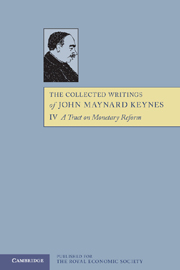Book contents
- Frontmatter
- Contents
- General Introduction
- Note to the reader
- Preface
- Preface to the French Edition
- 1 THE CONSEQUENCES TO SOCIETY OF CHANGES IN THE VALUE OF MONEY
- 2 PUBLIC FINANCE AND CHANGES IN THE VALUE OF MONEY
- 3 THE THEORY OF MONEY AND THE EXCHANGES
- 4 ALTERNATIVE AIMS IN MONETARY POLICY
- 5 POSITIVE SUGGESTIONS FOR THE FUTURE REGULATION OF MONEY
- Appendix I
- Appendix II
- Appendix III
- Index
Preface
Published online by Cambridge University Press: 05 November 2012
- Frontmatter
- Contents
- General Introduction
- Note to the reader
- Preface
- Preface to the French Edition
- 1 THE CONSEQUENCES TO SOCIETY OF CHANGES IN THE VALUE OF MONEY
- 2 PUBLIC FINANCE AND CHANGES IN THE VALUE OF MONEY
- 3 THE THEORY OF MONEY AND THE EXCHANGES
- 4 ALTERNATIVE AIMS IN MONETARY POLICY
- 5 POSITIVE SUGGESTIONS FOR THE FUTURE REGULATION OF MONEY
- Appendix I
- Appendix II
- Appendix III
- Index
Summary
We leave saving to the private investor, and we encourage him to place his savings mainly in titles to money. We leave the responsibility for setting production in motion to the business man, who is mainly influenced by the profits which he expects to accrue to himself in terms of money. Those who are not in favour of drastic changes in the existing organisation of society believe that these arrangements, being in accord with human nature, have great advantages. But they cannot work properly if the money, which they assume as a stable measuring-rod, is undependable. Unemployment, the precarious life of the worker, the disappointment of expectation, the sudden loss of savings, the excessive windfalls to individuals, the speculator, the profiteer—all proceed, in large measure, from the instability of the standard of value.
It is often supposed that the costs of production are threefold, corresponding to the rewards of labour, enterprise, and accumulation. But there is a fourth cost, namely risk; and the reward of risk-bearing is one of the heaviest, and perhaps the most avoidable, burden on production. This element of risk is greatly aggravated by the instability of the standard of value. Currency reforms, which led to the adoption by this country and the world at large of sound monetary principles, would diminish the wastes of risk, which consume at present too much of our estate.
Nowhere do conservative notions consider themselves more in place than in currency; yet nowhere is the need of innovation more urgent.
- Type
- Chapter
- Information
- The Collected Writings of John Maynard Keynes , pp. xiv - xvPublisher: Royal Economic SocietyPrint publication year: 1978

